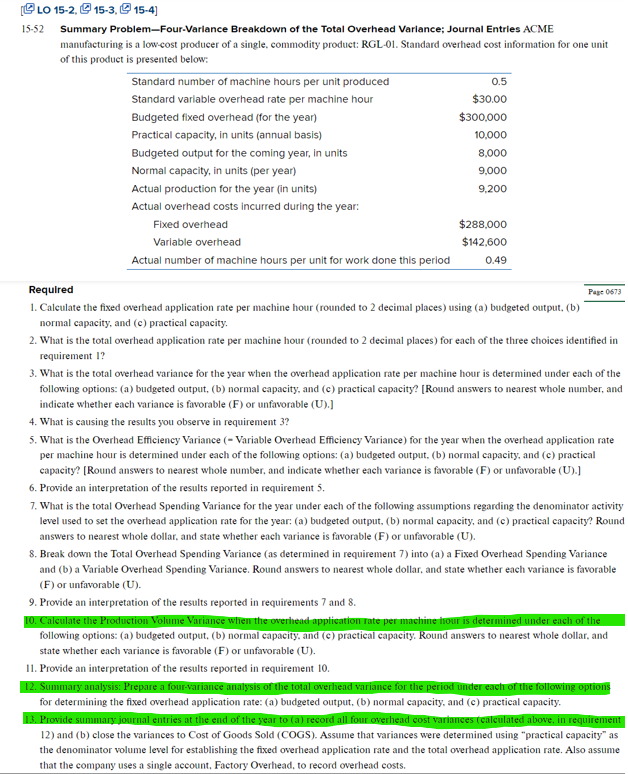Answered step by step
Verified Expert Solution
Question
1 Approved Answer
Required Calculate the fixed overhead application rate per machine hour ( rounded to 2 decimal places ) using ( a ) budgeted output, ( b
Required
Calculate the fixed overhead application rate per machine hour rounded to decimal places using a budgeted output, b
normal capacity, and c practical capacity.
What is the total overhead application rate per machine hour rounded to decimal places for each of the three choices identified in
requirement
What is the total overhead variance for the year when the overhead application rate per machine hour is determined under each of the
following options: a budgeted output, b normal capacity, and c practical capacity? Round answers to nearest whole number, and
indicate whether each variance is favorable F or unfavorable U
What is causing the results you observe in requirement
What is the Overhead Efficiency Variance Variable Overhead Efficiency Variance for the year when the overhead application rate
per machine hour is determined under each of the following options: a budgeted output, b normal capacity, and c practical
capacity? Round answers to nearest whole number, and indicate whether each variance is favorable F or unfavorable U
Provide an interpretation of the results reported in requirement
What is the total Overhead Spending Variance for the year under each of the following assumptions regarding the denominator activity
level used to set the overhead application rate for the year: a budgeted output, b normal capacity, and c practical capacity? Round
answers to nearest whole dollar, and state whether each variance is favorable F or unfavorable U
Break down the Total Overhead Spending Variance as determined in requirement into a a Fixed Overhead Spending Variance
and b a Variable Overhead Spending Variance. Round answers to nearest whole dollar, and state whether each variance is favorable
F or unfavorable U
Provide an interpretation of the results reported in requirements and
Calculate the Production Volume Variance when the overhead application rate per machine hour is determined under each of the
following options: a budgeted output, b normal capacity, and c practical capacity. Round answers to nearest whole dollar, and
state whether each variance is favorable F or unfavorable U
Provide an interpretation of the results reported in requirement
Summary analysis: Prepare a fourvariance analysis of the total overhend variance for the period under each of the following options
for determining the fixed overhead application rate: a budgeted output, b normal capacity, and c practical capacity.
Provide summary journal entries at the end of the year to a record all four overhead cost variances calculated above, in requirement
and b close the variances to Cost of Goods Sold COGS Assume that variances were determined using "practical capacity" as
the denominator volume level for establishing the fixed overhead application rate and the total overhead application rate. Also assume
that the company uses a single account, Factory Overhead, to record overhead costs.

Step by Step Solution
There are 3 Steps involved in it
Step: 1

Get Instant Access to Expert-Tailored Solutions
See step-by-step solutions with expert insights and AI powered tools for academic success
Step: 2

Step: 3

Ace Your Homework with AI
Get the answers you need in no time with our AI-driven, step-by-step assistance
Get Started


